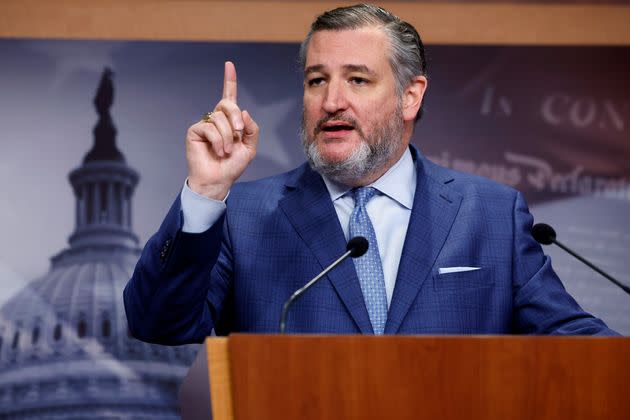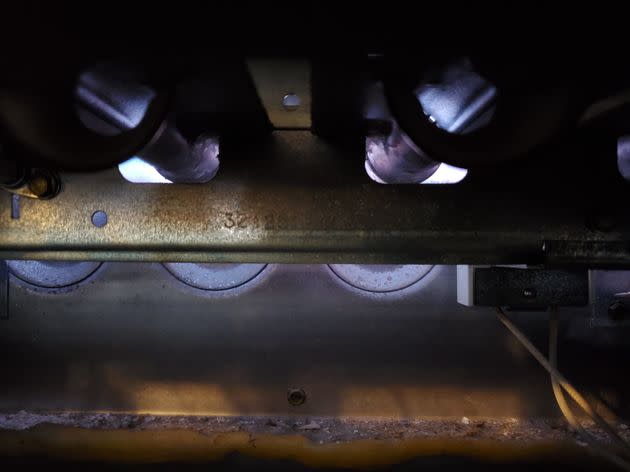Congress To Vote On Repealing Rule That Would Save Americans $1.5 Billion A Year On Heating
- Oops!Something went wrong.Please try again later.
The Senate is set to vote this week on whether to repeal the first major update to national standards for gas furnaces in four decades in a move experts say would save real estate developers and landlords a few hundred dollars but cost ratepayers and renters thousands in heating bills for wasted energy.
At least a handful of Democrats are expected to break with the chamber’s majority and join Republicans to pass legislation revoking the Department of Energy’s regulation. Starting four years from now, the rule finalized last September requires manufacturers to make the least efficient gas furnaces on the market today waste 15% less energy, cutting back on more carbon dioxide than the entirety of France emits in a single year and saving ratepayers money.
The vote could come as early as Tuesday evening, with the House of Representatives following soon after with a sister bill.
While mostly symbolic — President Joe Biden is almost certain to veto the legislation — the vote represents yet another flex of fossil fuel companies’ political muscle ahead of the presidential election. The industry is heavily betting against a second term for Biden, even though the last four years have brought record production and exports of U.S. oil and gas.
Drilling and sales of American fuel overseas may be up. But for the last two years, sales of heat pumps — essentially two-way air conditioners that heat and cool — nationwide have eclipsed gas furnaces, the gap growing in 2023. That poses a threat to gas utilities — and the sector is fighting back on multiple fronts.
Utilities have historically enjoyed monopolies over geographical areas, giving the companies a captive market of ratepayers whose monthly bills help pay to maintain the pipeline network. The nationwide shift toward electric appliances and heating systems threatens to throw gas utilities off balance, requiring companies to cut costs, decrease investor payouts and raise prices on loyal customers.

Slashing the 13% of America’s planet-heating emissions that come directly from burning fossil fuels to heat and cook in homes and buildings means replacing gas furnaces and stovetops with electric alternatives. The landmark climate-spending laws Biden passed include billions in subsidies to support the transition.
The regulation in question does almost nothing to nudge homeowners toward replacing fuel furnaces with electric heat pumps. Instead, the rule requires that gas furnaces sold after 2028 convert at least 95% of fuel into heat, up from 80% under the previous regulation. The mandate effectively banned what are called “non-condensing” or non-weatherized gas furnaces that, as a result of relying on just one heat exchanger instead of two, waste more energy.
Contractors often recommend non-condensing furnaces to buyers looking to cut back on upfront expenses, since condensing models — which have two heat exchangers — need extra ductwork for venting. Renovating existing homes to include new exhaust vents can add hundreds of dollars to the cost of installing a new furnace.
The rule does not require anyone to replace an existing furnace. Rather, the first major overhaul of furnace standards since Congress first gave the Energy Department the authority to do so in 1987 simply mandates that all models clear a higher bar. (The standards were last updated in 2007, but with only minor tweaks.)
Manufacturers of both the old and new models of gas furnaces broadly supported the Biden administration’s rule.
In comments submitted to the Energy Department during the rulemaking process, Carrier, Trane and Daikin backed the agency’s plans to set a 95% efficiency target for non-weatherized furnaces. Others, such as Rheem and the trade association AHRI, did not raise concerns about the 95% levels.
“Daikin stands ready to provide only condensing furnaces for U.S. consumers, similar to how such technology has been a minimum requirement in Canada since 2010,” Daikin, the parent company of the Goodman brand, said in a statement after the rule was finalized.
Some large utilities that sell both gas and electricity even supported the rule.
But the nation’s two largest trade groups representing gas utilities only — the American Gas Association and the American Public Gas Association — sued in January to block the Energy Department from implementing the rule. The lawsuit is pending.
To be clear, the new standards will not require anyone to replace their furnace; rather, they will ensure that all purchasers... have a wider range of efficient options that will result in energy bill savings.Energy efficiency advocates to Congress
In the meantime, the APGA threw its weight behind Sen. Ted Cruz (R-Texas), who introduced legislation to revoke Biden’s gas furnace rule under the Congressional Review Act.
“I’m committed to doing everything in my power to push back against this rule that puts the radical left’s fringe climate agenda before the needs of the American people,” Cruz said in a press release.
The regulation certainly benefits the worldwide effort to cut planet-heating emissions. The Energy Department’s analysis found that, as of 2022, gas furnaces in homes accounted for nearly one-fifth of all residential energy usage. By updating the standards, the agency estimated that U.S. emissions would drop by 332 million metric tons — equal to the annual carbon pollution from 42 million homes, or roughly 34% of households in the U.S. — over the next 30 years.
At a time when Americans’ debt to utilities has swelled to a record $20.3 billion, with $2.5 billion added last year alone, the regulation’s benefits to cash-strapped ratepayers are likely the most urgent. With less energy going to waste, U.S. utility bills on the whole would drop by $1.5 billion per year, the Energy Department found. The average household that replaces an old furnace with a new condensing unit would see annual heating bills drop by about $50 per year, according to calculations from advocacy groups that called on Congress this week to vote against the rollback bill.
“Savings will be much higher for families that live in colder climates, especially if they live in an older, poorly insulated home,” reads an open letter published this week and signed by a dozen environment and consumer watchdog groups. “To be clear, the new standards will not require anyone to replace their furnace; rather, they will ensure that all purchasers — including builders of new homes, owners of rental properties, and homeowners — have a wider range of efficient options that will result in energy bill savings.”

Renters in particular stand to benefit from the new rule, the groups said, because they “rarely get to choose their own furnace but are stuck paying the energy bills and are disproportionately lower income households that need the bill savings the most.”
Momentum to decarbonize buildings started gathering in 2019 when Berkeley, California, became the first city to ban new construction from hooking up to the gas system. More than 140 cities and local governments followed suit, adopting similar policies.
In response, more than half of U.S. states ultimately passed laws preempting the local prohibitions — essentially banning the bans. Industry groups, meanwhile, filed suit with the U.S. Court of Appeals for the 9th Circuit ruling against Berkeley’s ban last year.
Around the same time, local governments tried using their power to vote on what building codes made it into the third-party codebook used across the country as a model for construction guidelines. Yet even there the gas industry thwarted its opponents, lobbying the nonprofit International Code Council to strip provisions to make the wiring for electric appliances and car chargers standard in all new construction.
When proponents of greener codes once again won widespread support for including similar pro-electrification measures in the latest update to the codebook — this time using a new process that reduced the input from governments and gave industry more say — gas utilities still managed to block the proposals from taking effect at the last minute.
Critics, including a few progressive-leaning lawmakers in Congress, called the latest gutting of the nation’s building codes “a scandal.” To those same gas trade groups now backing Cruz’s rollback bill, however, it was just the start.
One week later, as part of a settlement to end the federal litigation it lost last year, the city of Berkeley agreed to repeal its gas ban.
